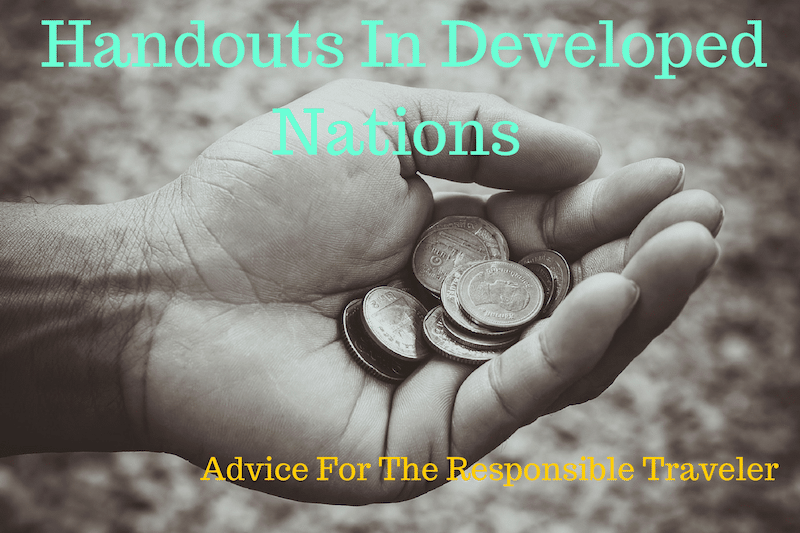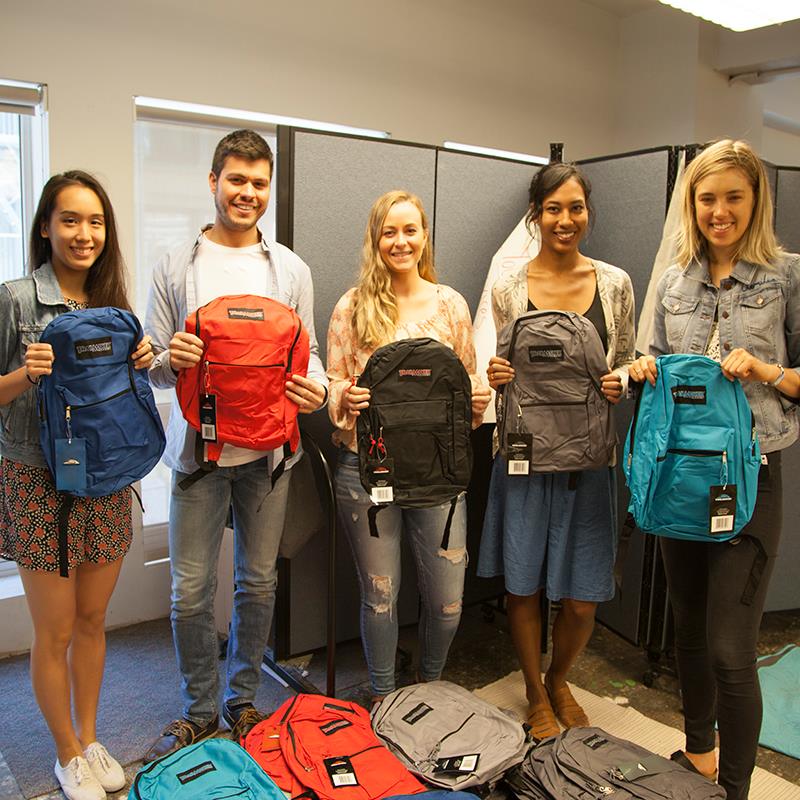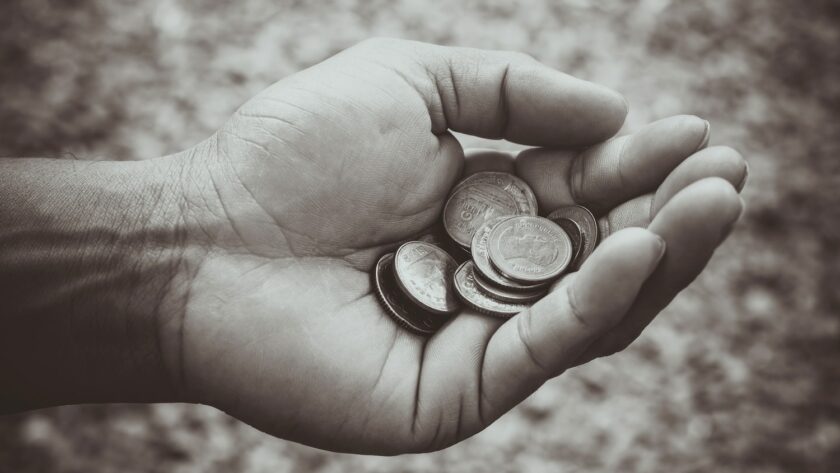
Traveling from an industrialized country to a location where markers of systemic poverty might be more prevalent, we often feel moved by sympathy and a desire to make an altruistic gesture. Conventional wisdom and responsible travel experts, however, advise that when traveling in developing countries, giving handouts like money, toys or food can perpetuate a cycle of begging and can be harmful to vulnerable communities. But what about traveling in developed countries?
If you happen to live in a major city, you may be accustomed to encountering panhandlers on a daily basis, and you may have heard a variety of advice on what to do:
Give money if you want, but only a little.
Give a gift card instead of cash.
Give food and/or bottled water, but never cash.
Offer to buy someone a meal.
Politely decline.
Keep walking and do not engage.
What’s important to keep in mind is that charitable impulses are not inherently wrong. Issues arise, though, when charitable impulses are misguided, often because of a lack of nuanced understanding of systemic poverty and its related social issues, like homelessness and panhandling.
Charitable impulses are not inherently wrong; but, they can be misguided. #travelgood Click To Tweet
When The Real Story Isn’t Apparent
Audrey Scott of Uncornered Market shares her experience after five years of living in Prague. “It came to light that many of the beggars in Old Town were part of a sort of mafia,” she said. “They paid fees to keep their ‘begging corners’ and supported organized crime in that way. Also, the begging mafia supposedly kept people from ever doing ‘too well’ so as to not lose them.”
Another prime example is Atlanta, Georgia, which hosted over 50 million visitors in 2015, according to the Atlanta Convention and Visitors Bureau. City government ordinances have been implemented to curtail aggressive panhandling, which can be prevalent in areas that attract travelers. Here, visitors and locals alike are encouraged to redirect their giving to convenient options like “giving meters” sprinkled throughout the city. Money put into these meters are redirected to local agencies that provide services to help those in need.
What Harm Can Giving $1 Do?
But handing someone a dollar bill is simple, right? What’s the harm?
George Chidi, Social Impact Director for Central Atlanta Progress, explains there are many reasons why supplying panhandlers with financial handouts can be harmful.
“The short answer is you should never give a panhandler money,” he said. “Statistically, it is very likely that you are facilitating someone’s resistance to mental health services or supplying someone with funds for drugs or alcohol.”
Chidi elaborates by roughly categorizing those who ask for handouts into four categories: those who genuinely need a few cents for a bus ride or a parking meter, those with an addiction, those who suffer from a mental illness and are service-resistant and those who are short-term panhandlers, sometimes referred to as “grifters.”
“People who are honestly destitute tend to seek social services, not panhandling,” he said. “People who are in the greatest need aren’t on a corner. They are seeking services.”
Because a financial handout is often going to be used to support a harmful habit or sustain a living outside of mental health services, it is often described as a “lose-lose” situation.
What harm can a $1 handout do? More than you may think. #travel #good Click To TweetThe Truth About Giving Gifts
But what about gift cards, food handouts, or buying someone a meal? Proceed with caution, Chidi advised.
“Gift cards are better than cash, but they can still be traded for cash,” he explained. “And taking someone to buy them a meal puts you in close contact with someone who could be a very skilled pickpocket or who will simply say ‘Thanks for the meal’ and still ask you for money.”
The Center for Problem-Oriented Policing notes that “[c]onventioneers and tourists are good targets for panhandlers because they are already psychologically prepared to spend money,” but they acknowledge the important point that “[i]n all likelihood, if people stopped giving money to panhandlers, panhandling would cease.”
Across the board, social issue advocates and responsible tourism organizations give the same advice: educate yourself and redirect your charitable impulse away from “toxic charity” to an informed and legitimate charitable act. Further, in a commentary piece in the Canadian Medical Association Journal, medical and public health officials commented that “[t]he cost of homelessness to society as a whole and to homeless people themselves goes well beyond the nuisance of public intoxication and panhandling and the impact on tourism,” so it is important to keep in mind the complex, multi-faceted nature of these social issues that extends far beyond a vacation.

Creating Sustainable Initiatives
Brooklyn-based Jessica Festa, editor of Epicure & Culture, notes that when walking the five blocks to her nearest subway station she is asked for $1 from anywhere from one to five different people. It can be tough because you want to help, but what ultimately is running through her mind is the issue of sustainability.
“I see the same people on my block everyday begging for money. Even if they use that money to buy lunch, it’s not a healthy or sustainable solution to give handouts. I believe the answer exists in helping these people gain skills and employment and find permanent housing, as well as setting them up so they can be the creators of their own destiny so it no longer depends on who gives them some coins.”
In New York City some examples of this include the city providing the homeless with one-way tickets to anywhere in the world if they have a place to stay elsewhere (and sometimes even helping them get started with rent), the Coalition for the Homeless’ First Step Job Training Program helping the homeless and low-income woman gain career skills, and Career Gear‘s programs that give men in poverty access to interview preparation and business attire. With programs like these the items and services given aren’t one-off, but are helping create a foundation for lasting change for individuals in need.
The issue of #giving handouts exists in both impoverished AND developed communities. #travel Click To TweetDo Your Research
Before a suitcase is even packed, researching the social issues of your destination and the organizations that work to combat those issues can lead to a “win-win” choice, like a charitable monetary donation given online, or fulfilling a few specified “wish list” items for a local shelter. Just don’t assume you know what people need. Contact nonprofits and social good organizations on the ground in your destination to learn the real story.
Developed or developing, at home or abroad, there are indeed best practices for how to follow through on the very human impulse of wanting to give back.
Latest posts by Paige Sullivan (see all)
- Holiday Treats & Christmas Traditions Around The World - Dec 19, 2016
- Handouts In Developed Nations: Advice For The Responsible Traveler - Jun 7, 2016
- 5 Immersive Culinary Enclaves To Savor In NYC - Feb 18, 2016
- Traveling Responsibly & Protecting Fragile Environments - Jan 9, 2016
- Can Tiger Tourism Be Responsible? - Jan 9, 2016




